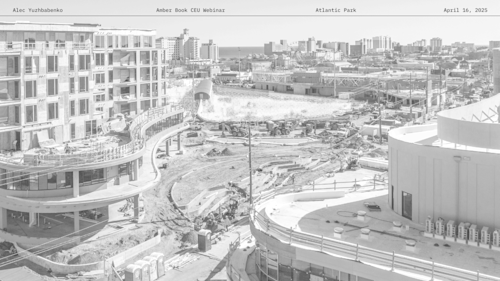
The definition of notetaking in class: the spoken words of the teacher become the written words of the student without the student understanding either one.
Brain scientists know that the surest—albeit not the fastest—path to content ownership and long-term recall runs through:
Embracing doubt
Practicing recall, and
Rephrasing the content you study in your own words
Simply highlighting the relevant passages in a book doesn’t meaningfully help you study because highlighting does none of those three. You already suspected that highlighting has failed you based on your own experience, but it’s so easy to passively do.
Making ARE 5.0 flashcards in your own words and then testing yourself using those flashcards meets all three criteria: it embraces doubt when you test yourself, it practices recall and, if done correctly, it rephrases content into your own words.
If the content you study moves left-to-right, make your flashcard move right-to-left. For instance, you are studying a practice exam question that provides the cost per square foot of asphalt, the cost per roll of geotextile, the cost per cubic foot of gravel and the cost per linear foot of curb — then it asks you to calculate the cost of 40 feet of roadway. This type of calculation (asking you to reconcile volume, area, and linear units in construction) shows up in nearly all of the NCARB ARE 5.0 divisions.
How do you then approach it from the other direction? Make your own problem, a cousin of what you just answered — but this time, give the cost per linear foot of a foundation, the cost per CMU of the backup wall, the cost per square foot of the cladding, the total budget, and height of the wall.
Then, ask how many linear feet of the wall can you afford with that budget. If what you study is a way of measuring air-tightness, make a flashcard seeking best practices to detail for air-tightness. If what you study offers best practices for designing structural systems, make a flash card for measuring forces in an existing structural system. This “coming at it from the other direction” process proves difficult if you don’t fully understand the material — and that’s the point.
Use flashcards to explain content to an imaginary person, not in my words as the Amber Book narrator and not in the book author’s words, but in your own words. Cognitive scientists have found this to be the single most impactful study hack for long-term recall. That’s why writing exactly what the teacher says is weak compared to rephrasing the lecture with your own examples.
When making flashcard questions, they need to be good questions. What makes a good question? A test item has value if those who own the content are likely to answer the question correctly and those who don’t know the content are likely to answer incorrectly.
Including “gotcha” questions with picky or tricky phrases, architecture trivia, or obscure vocabulary on your flashcards misses the point. Questions, rather, should be thoughtful and instructive.
An example of a strong ARE 5.0 flashcard that separates those who own content from those who don’t own content:
What is included in a property deed? Select the best four answers.
A written description of the property
Legal language transferring the property from a seller to a buyer
Mortgage or loan information related to the property purchase
The buyer’s name
A map or a plat of the land
The name and signature of the seller
A bad example of an ARE 5.0 study materials flashcard (too easy):
What is a deed? Select the best answer.
A legal document that transfers property from buyer to seller
A type of building foundation
An exceptionally strong concrete mix
Another bad example of an ARE 5.0 flashcard (too picky and not universally valid for all deeds):
The phrase ______ is included in a property deed?
“Witnesseth, That the said grantor, for good and valuable consideration, the receipt of which is hereby acknowledged, does hereby remise, release and quitclaim until the said Grantee forever”
“This Security Instrument secures to Lender: (i) the repayment of the Loan and all renewals, extensions, and modifications of the Note; and (ii) the performance of Borrower’s covenants and agreements under this Security Instrument and the Note”
Making these types of flashcards takes a long time, and using this strategy may not be an efficient mode of studying. It works best for those who:
Have a lot of time to study
Suffer from a deficiency in content or have a poor track record on past ARE 5.0 exams
Similar to me, enjoy studying
I’m living proof that having to explain the concepts in your own words makes them sticky. I have deep ownership of so much NCARB ARE 5.0 content precisely because I explain it to people nearly every day in my job.

At Amber Book, we’re such fans of ARE flashcards that when we couldn’t find a flashcard plugin that allowed us to post images and videos within the digital flashcards, we created our own flashcard software and made more than 1,000 flashcards to create the best study materials.

Note that Amber Book flashcards are not review flashcards to reinforce content from other portions of the Amber Book course, but rather, they offer new content not included in the animated instructional video sections.
Thinkific, the learning management software with 60,000-course creators that hosts Amber Book, became smitten with our flashcard software and asked us to include it in their app store. I’m meeting later today with developers to make that happen. Look for it: right now our placeholder name for the product is Flashy.

Getting licensed as an architect in any U.S. jurisdiction is no small feat. It takes years of education, thous...Read More

The AIA Conference on Architecture is like the Super Bowl for architects. It’s that perfect mix of connecting ...Read More

Every architect begins their journey with a sketch. A line drawn with ambition, inspiration, and the dream of ...Read More